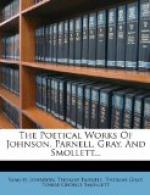[Footnote 4; ‘Clare:’ Elizabeth de Burg, Countess of Clare, was wife of John de Burg, son and heir of the Earl of Ulster, and daughter of Gilbert de Clare, Earl of Gloucester, by Joan of Acres, daughter of Edward I.; hence the poet gives her the epithet of ‘princely.’ She founded Clare Hall.]
[Footnote 5: ‘Anjou’s heroine:’ Margaret of Anjou, wife of Henry VI., foundress of Queen’s College.]
[Footnote 6: ‘Rose:’ Elizabeth Widville, wife of Henry IV. She added to the foundation of Margaret of Anjou.]
[Footnote 7: ‘Either Henry:’ Henry VI. and Henry VII., the former the founder of King’s, the latter the greatest benefactor to Trinity College.]
[Footnote 8: ‘Margaret:’ Countess of Richmond and Derby, the mother of Henry VII., foundress of St John’s and Christ’s Colleges.]
[Footnote 9: ‘Tudor:’ the Countess was a Beaufort, and married to a Tudor; hence the application of this line to the Duke of Grafton, who claimed descent from both these families.]
[Footnote 10: ‘Wreath:’ Lord Treasurer Burleigh was Chancellor of the University in the reign of Queen Elizabeth.]
* * * * *
MISCELLANEOUS.
A LONG STORY.
ADVERTISEMENT.—Gray’s ‘Elegy,’ previous to its publication, was handed about in MS., and had, amongst other admirers, the Lady Cobham, who resided in the mansion-house at Stoke-Pogeis. The performance inducing her to wish for the author’s acquaintance, Lady Schaub and Miss Speed, then at her house, undertook to introduce her to it. These two ladies waited upon the author at his aunt’s solitary habitation, where he at that time resided, and not finding him at home, they left a card behind them. Mr Gray, surprised at such a compliment, returned the visit; and as the beginning of this intercourse bore some appearance of romance, he gave the humorous and lively account of it which the ‘Long Story’ contains.
1 In Britain’s isle, no matter where,
An ancient pile
of building[1] stands:
The Huntingdons and Hattons
there
Employ’d
the power of fairy hands,
2 To raise the ceiling’s fretted
height,
Each pannel in
achievements clothing,
Rich windows that exclude
the light,
And passages that
lead to nothing.
3 Full oft within the spacious walls,
When he had fifty
winters o’er him,
My grave Lord-Keeper[2] led
the brawls:
The seal and maces
danced before him.
4 His bushy beard and shoe-strings green,
His high-crown’d
hat and satin doublet,
Moved the stout heart of England’s
Queen,
Though Pope and
Spaniard could not trouble it.
5 What, in the very first beginning,
Shame of the versifying
tribe!
Your history whither are you
spinning?
Can you do nothing
but describe?




